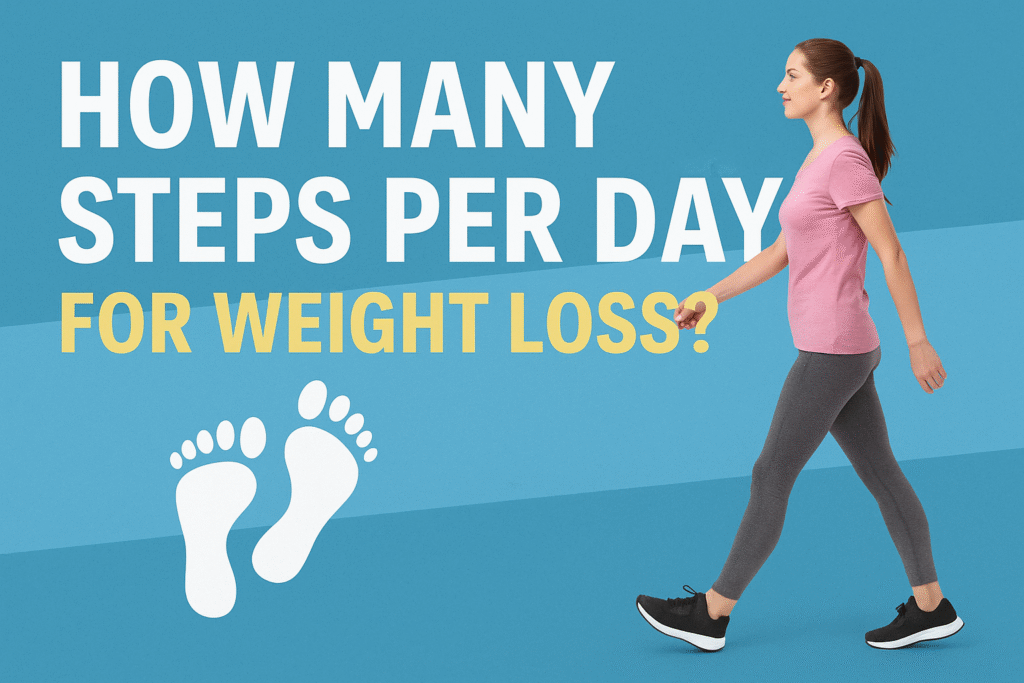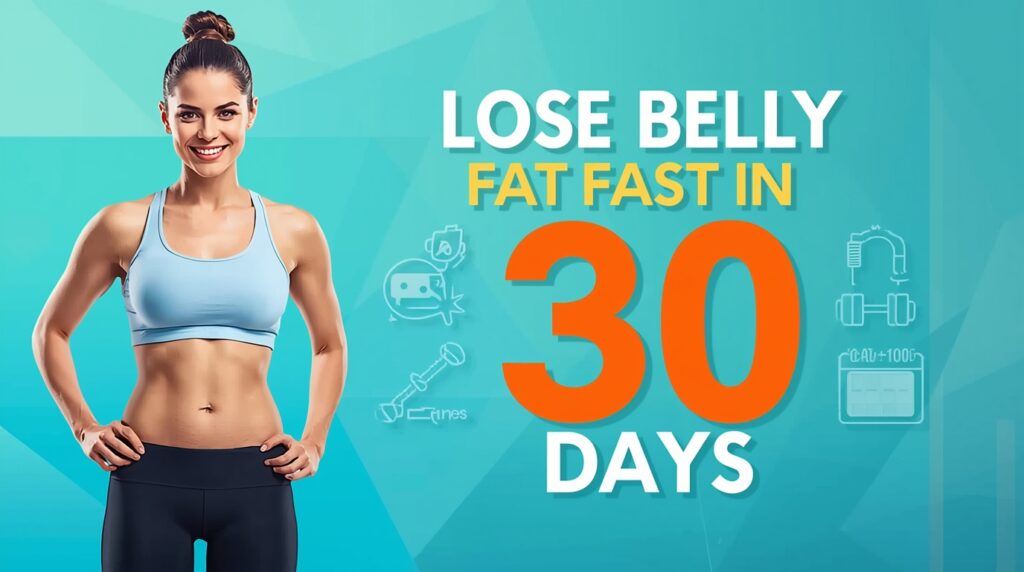Weight loss is a topic that has gained significant attention in today’s society due to rising concerns about obesity and related health issues. While the road to weight loss can be challenging, it is entirely possible with the right approach. Weight loss is not simply about restricting food or exercising endlessly it’s about making healthier, sustainable choices that benefit both your body and mind. The key to success lies in understanding how your body works and what it needs to function optimally.
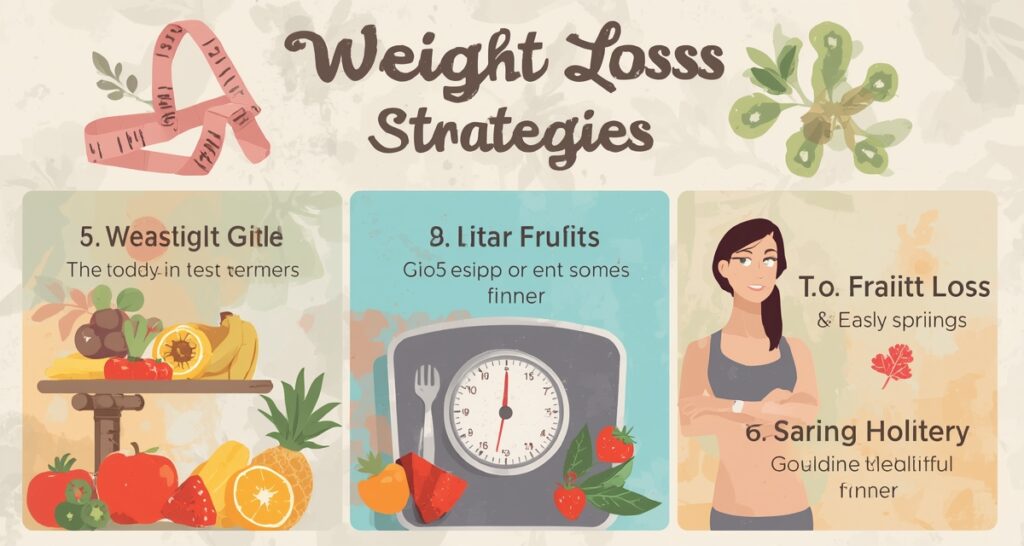
This article explores proven methods for effective weight loss, providing insights into diet, exercise, lifestyle habits, and psychological aspects that influence your journey to a healthier weight.
The Importance of a Balanced Diet for Weight Loss
The foundation of any successful weight loss journey is a balanced diet. Nutrition plays a critical role in helping you lose weight while maintaining your energy and health. Fad diets may promise quick results, but they often lead to temporary weight loss followed by regaining the lost weight. Sustainable weight loss requires a lifestyle change with healthy eating habits.
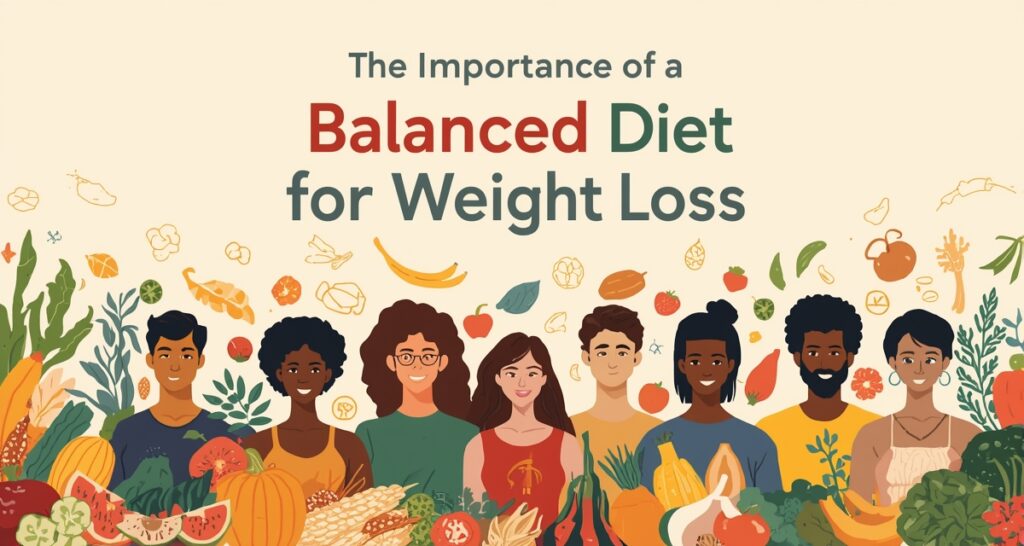
1. Eat More Whole Foods
Whole foods, such as vegetables, fruits, lean proteins, and whole grains, should be the cornerstone of your diet. These foods are nutrient-dense, meaning they provide a high amount of essential nutrients for relatively few calories. A diet rich in whole foods can reduce the intake of processed foods, which are typically high in sugars, unhealthy fats, and empty calories.
For example:
- Vegetables and fruits are packed with vitamins, minerals, fiber, and antioxidants. They are also low in calories, making them ideal for weight loss.
- Whole grains such as brown rice, oats, quinoa, and barley are great sources of complex carbohydrates and fiber. Unlike refined grains, they help keep you fuller for longer and stabilize blood sugar levels.
- Lean proteins, such as chicken, fish, tofu, and beans, support muscle repair and growth while promoting a feeling of fullness.
2. Portion Control
Portion sizes matter more than the types of food alone. Overeating even healthy food, can contribute to weight gain. Using smaller plates, measuring portions, and being mindful of hunger cues can help avoid overeating. Learning to listen to your body and eating only until you’re satisfied rather than full is a critical skill in weight management.
3. Avoid Sugary Drinks and Excess Sugar
Sugary drinks like soda, energy drinks, and sugary teas are among the leading causes of weight gain. These beverages contain empty calories and can lead to an increase in fat storage. Opt for water, herbal teas, or black coffee as healthier alternatives. Reducing the intake of added sugars in processed foods and snacks is also essential for weight loss.
The Role of Physical Activity in Weight Loss
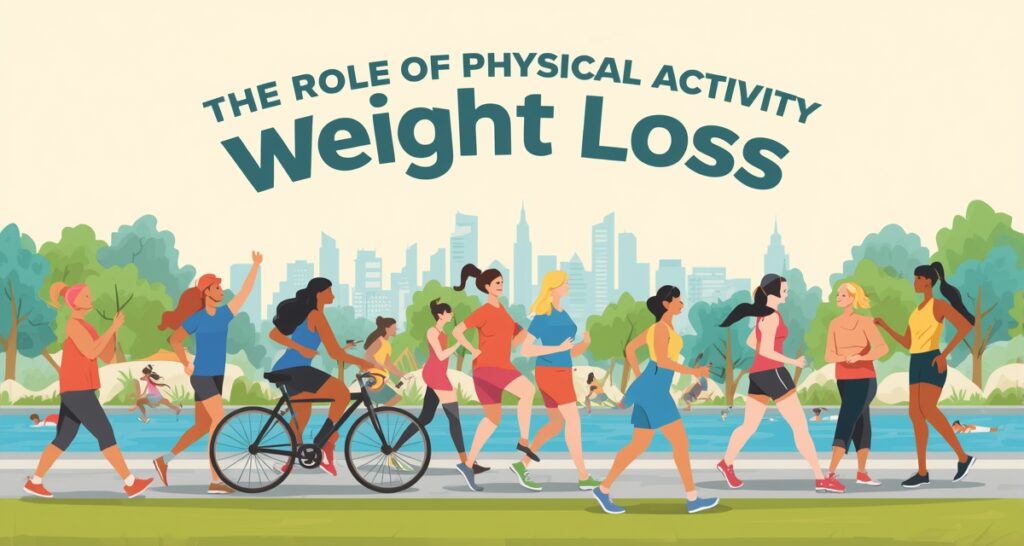
Exercise is a powerful tool in the battle against weight gain. It not only helps burn calories but also improves overall health by boosting metabolism, reducing stress, and increasing energy levels. A combination of cardiovascular (aerobic) exercises and strength training is ideal for shedding pounds and building muscle.
1. Cardiovascular Exercise (Cardio)
Cardiovascular exercise involves activities that raise your heart rate, making it one of the best ways to burn calories and improve cardiovascular health. Some effective cardio exercises include:
- Walking and jogging: These are simple, low-impact exercises that can be done almost anywhere.
- Cycling: Whether outdoors or on a stationary bike, cycling is a great way to burn fat and improve leg strength.
- Swimming: This full-body workout burns calories quickly while being easy on the joints.
Aim for at least 150 minutes of moderate-intensity cardio per week, or 75 minutes of vigorous-intensity cardio, as recommended by the World Health Organization (WHO).
2. Strength Training
Strength training, or resistance training, involves exercises that build muscle by working against resistance. Building lean muscle mass is vital for weight loss because muscles burn more calories at rest than fat. Incorporating weight lifting, bodyweight exercises (like push-ups, squats, lunges), or using resistance bands can significantly improve body composition.
Aim for strength training exercises at least two to three times per week. By combining strength training and cardio, you’ll not only lose fat but also enhance muscle tone and metabolism.
The Significance of Hydration for Weight Loss

Drinking enough water is one of the simplest and most effective ways to support weight loss. Sometimes, the body can confuse thirst with hunger, leading to overeating when a glass of water is all that’s needed. Proper hydration helps regulate metabolism, flush out toxins, and curb hunger pangs.
Drinking water before meals can help reduce appetite, preventing overeating. Aim to drink at least 8 cups of water daily, but if you are physically active or live in a hot climate, you may need more.
Quality Sleep and Stress Management

Sleep and stress management are often neglected but are crucial to weight loss. Lack of sleep and chronic stress can significantly hinder your efforts to shed pounds.
1. Sleep and Its Impact on Weight Loss
When you don’t get enough sleep, it can disrupt the balance of hormones that regulate hunger. Leptin, the hormone that tells you when you’re full, decreases, while ghrelin, the hormone that signals hunger, increases. This hormonal imbalance can lead to overeating and weight gain.
Read More: Peptides for Weight Loss: Pros, Cons, and More
Aim for 7-9 hours of quality sleep each night. Creating a bedtime routine, limiting screen time before bed, and ensuring your sleep environment is dark and quiet can promote better rest.
2. Managing Stress
Stress is another factor that can hinder weight loss. When stressed, the body produces cortisol, a hormone that triggers hunger and cravings for unhealthy, high-calorie foods. Chronic stress can lead to emotional eating and disrupt healthy eating patterns.
To manage stress, consider activities like:
- Meditation and mindfulness: These practices can help calm the mind and reduce stress levels.
- Exercise: Physical activity is not only good for your body but also a great way to relieve stress.
- Yoga: Yoga combines physical movement with breathing exercises, which can help reduce stress and anxiety.
he Psychological Aspect of Weight Loss
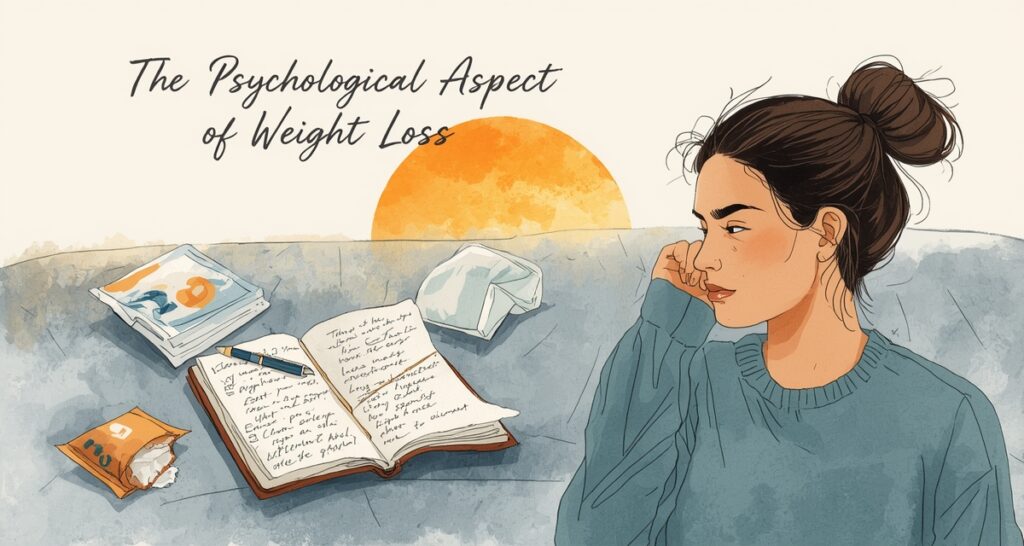
Weight loss isn’t just a physical process; it’s also a psychological one. Many people struggle with emotional eating, negative body image, and self-sabotage during their weight loss journey. Understanding and addressing the emotional triggers behind unhealthy eating habits is key to long-term success.
1. Set Realistic Goals
Setting achievable, realistic goals is essential for staying motivated. Focus on small, incremental changes rather than aiming for rapid, unsustainable results. For example, instead of aiming to lose 20 pounds in a month, set a goal to lose 1-2 pounds per week, which is a healthy and realistic target.
2. Build a Support System
Having a support system can make the weight loss journey easier. Surround yourself with friends, family, or even online communities that share similar goals. Having someone to share your challenges and successes with can boost your motivation and help you stay on track.
Conclusion
Effective weight loss requires a combination of healthy eating, regular exercise, proper hydration, sleep, and stress management. There’s no one-size-fits-all approach, and what works for one person may not work for another. However, by adopting a balanced lifestyle and making gradual changes, you can achieve sustainable weight loss and improve your overall health.
Remember, the key is to approach weight loss as a long-term lifestyle change rather than a short-term fix. By taking small, consistent steps, you’ll not only lose weight but also build healthier habits that will last a lifetime.
Frequently Asked Questions
1. How much weight can I expect to lose in a month?
The amount of weight you can lose in a month depends on several factors, including your starting weight, metabolism, exercise routine, and diet. On average, a safe and sustainable rate of weight loss is 1-2 pounds per week, meaning you can expect to lose about 4-8 pounds in a month.
2. What is the best diet for weight loss?
There isn’t a one-size-fits-all diet for weight loss. However, diets that emphasize whole, unprocessed foods—such as vegetables, fruits, lean proteins, whole grains, and healthy fats—are the most effective. Popular diets like the Mediterranean Diet, low-carb diets, or intermittent fasting may work for some people, but it’s essential to choose a plan that you can maintain long-term.
3. How can I reduce belly fat?
To reduce belly fat, a combination of healthy eating, cardiovascular exercise, and strength training is key. Focus on reducing your overall body fat percentage through diet and exercise. Cutting back on refined sugars and processed foods can also help target abdominal fat.
4. Is exercise necessary for weight loss?
While it’s possible to lose weight through diet alone by creating a calorie deficit, exercise accelerates weight loss, improves muscle tone, and boosts overall health. A combination of cardio (to burn calories) and strength training (to build muscle) is most effective for long-term weight loss.
5. Can I lose weight without counting calories?
Yes, it’s possible to lose weight without obsessively counting calories, but you’ll still need to make healthy food choices and watch portion sizes. Focus on eating nutrient-dense foods like fruits, vegetables, whole grains, and lean proteins. Mindful eating, listening to your body’s hunger cues, and avoiding emotional eating are also important for weight loss.
6. How important is sleep for weight loss?
Sleep is crucial for weight loss. Lack of sleep can disrupt hunger hormones, increasing cravings for unhealthy foods and leading to overeating. Aim for 7-9 hours of quality sleep each night to support your weight loss efforts.
Q7. Are weight loss supplements effective?
Some weight loss supplements may have a minor effect on appetite or metabolism, but they are not a substitute for a healthy diet and exercise. Many supplements also come with side effects, and their long-term effectiveness is often questionable. Always consult a healthcare professional before using any supplements.
Q8. Can stress affect my weight?
Yes, stress can impact your weight. Stress triggers the release of cortisol, a hormone that can increase cravings for high-calorie foods and lead to emotional eating. Managing stress through techniques like meditation, yoga, and regular exercise can help prevent stress-related weight gain.
Q9. How do I avoid regaining the weight I lost?
To prevent regaining weight, focus on maintaining a healthy lifestyle rather than seeing weight loss as a temporary goal. Continue to eat a balanced diet, stay physically active, and make sustainable changes to your daily habits. Regularly monitor your weight, and make adjustments if necessary.
Q10. Is intermittent fasting a good way to lose weight?
Intermittent fasting can be an effective weight loss tool for some people. It involves alternating between periods of eating and fasting, which may help reduce calorie intake. However, it’s important to ensure that you’re still eating balanced meals during eating windows. It’s not suitable for everyone, especially those with certain health conditions.
Q11. Can drinking water help with weight loss?
Yes, staying hydrated can support weight loss. Drinking water before meals can help you feel fuller, reducing the likelihood of overeating. Additionally, replacing sugary drinks with water can help reduce calorie intake.
Q12. What role does strength training play in weight loss?
Strength training is essential for building lean muscle, which in turn boosts your metabolism. More muscle means your body burns more calories at rest. Combining strength training with cardiovascular exercise is the most effective way to lose fat and improve body composition.

